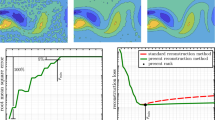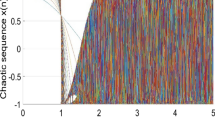Abstract
In this paper, we consider the parameter estimation problem of dual-frequency signals disturbed by stochastic noise. The signal model is a highly nonlinear function with respect to the frequencies and phases, and the gradient method cannot obtain the accurate parameter estimates. Based on the Newton search, we derive an iterative algorithm for estimating all parameters, including the unknown amplitudes, frequencies, and phases. Furthermore, by using the parameter decomposition, a hierarchical least squares and gradient-based iterative algorithm is proposed for improving the computational efficiency. A gradient-based iterative algorithm is given for comparisons. The numerical examples are provided to demonstrate the validity of the proposed algorithms.




Similar content being viewed by others
References
B. Boashash, Estimating and interpreting the instantaneous frequency of a signal—part 1: fundamentals. Proc. IEEE 80(4), 520–538 (1992)
Y. Cao, P. Li, Y. Zhang, Parallel processing algorithm for railway signal fault diagnosis data based on cloud computing. Future Gener. Comput. Syst. 88, 279–283 (2018)
Y. Cao, L.C. Ma, S. Xiao et al., Standard analysis for transfer delay in CTCS-3. Chin. J. Electron. 26(5), 1057–1063 (2017)
Y. Cao, G. Wei, F.J. Chen, An exact analysis of modified covariance frequency estimation algorithm based on correlation of single-tone. Signal Process. 92(11), 2785–2790 (2012)
Y. Cao, Y. Wen, X. Meng, W. Xu, Performance evaluation with improved receiver design for asynchronous coordinated multipoint transmissions. Chin. J. Electron. 25(2), 372–378 (2016)
G.Y. Chen, M. Gan, C.L.P. Chen et al., A regularized variable projection algorithm for separable nonlinear least squares problems. IEEE Trans. Autom. Control. 64(2), 1 (2019). https://doi.org/10.1109/TAC.2018.2838045
G.Y. Chen, M. Gan, F. Ding et al., Modified Gram–Schmidt method-based variable projection algorithm for separable nonlinear models. IEEE Trans. Neural Netw. Learn. Syst. 1, 1 (2018). https://doi.org/10.1109/TNNLS.2018.2884909
M.Z. Chen, D.Q. Zhu, A workload balanced algorithm for task assignment and path planning of inhomogeneous autonomous underwater vehicle system. IEEE Trans. Cogn. Dev. Syst. PP, 1 (2018). https://doi.org/10.1109/TCDS.2018.2866984
J.L. Ding, Recursive and iterative least squares parameter estimation algorithms for multiple-input–output-error systems with autoregressive noise. Circuits Syst. Signal Process. 37(5), 1884–1906 (2018)
J.L. Ding, The hierarchical iterative identification algorithm for multi-input–output-error systems with autoregressive noise. Complexity (2017) https://doi.org/10.1155/2017/5292894 (Article ID 5292894)
F. Ding, H.B. Chen, L. Xu et al., A hierarchical least squares identification algorithm for Hammerstein nonlinear systems using the key term separation. J. Frankl. Inst. 355(8), 3737–3752 (2018)
F. Ding, L. Xu, F.E. Alsaadi, T. Hayat, Iterative parameter identification for pseudo-linear systems with ARMA noise using the filtering technique. IET Control Theory Appl. 12(7), 892–899 (2018)
M. Gan, C.L.P. Chen, G.Y. Chen et al., On some separated algorithms for separable nonlinear squares problems. IEEE Trans. Cybern. 48(10), 2866–2874 (2018)
M. Gan, H.X. Li, H. Peng, A variable projection approach for efficient estimation of RBF-ARX model. IEEE Trans. Cybern. 45(3), 462–471 (2015)
Z.W. Ge, F. Ding, L. Xu, A. Alsaedi, T. Hayat, Gradient-based iterative identification method for multivariate equation-error autoregressive moving average systems using the decomposition technique. J. Frankl. Inst. 356, 1–19 (2019). https://doi.org/10.1016/j.jfranklin.2018.12.002
F.Z. Geng, S.P. Qian, An optimal reproducing kernel method for linear nonlocal boundary value problems. Appl. Math. Lett. 77, 49–56 (2018)
P.C. Gong, W.Q. Wang, F.C. Li et al., Sparsity-aware transmit beamspace design for FDA-MIMO radar. Signal Process. 144, 99–103 (2018)
Y. Gu, F. Ding, J.H. Li, States based iterative parameter estimation for a state space model with multi-state delays using decomposition. Signal Process. 106, 294–300 (2015)
Y. Gu, J. Liu, X. Li, State space model identification of multirate processes with time-delay using the expectation maximization. J. Frankl. Inst. 356, 1–17 (2019). https://doi.org/10.1016/j.jfranklin.2018.08.030
M. Hou, Amplitude and frequency estimator of a sinusoid. IEEE Trans. Autom. Control 50(6), 855–858 (2005)
M. Hou, Estimation of sinusoidal frequencies and amplitudes using adaptive identifier and observer. IEEE Trans. Autom. Control 52(3), 493–499 (2007)
M. Hou, Parameter identification of sinusoids. IEEE Trans. Autom. Control 57(2), 467–472 (2012)
Y.B. Hu, Q. Zhou, H. Yu, Z. Zhou, F. Ding, Two-stage generalized projection identification algorithms for controlled autoregressive systems. Circuits Syst. Signal Process. 38, 1–17 (2019). https://doi.org/10.1007/s00034-018-0996-0
X.Y. Li, B.Y. Wu, A new reproducing kernel collocation method for nonlocal fractional boundary value problems with non-smooth solutions. Appl. Math. Lett. 86, 194–199 (2018)
F.B. Li, L.G. Wu, P. Shi, C.C. Lim, State estimation and sliding mode control for semi-Markovian jump systems with mismatched uncertainties. Automatica 51, 385–393 (2015)
J.H. Li, W. Zheng, J.P. Gu, L. Hua, A recursive identification algorithm for Wiener nonlinear systems with linear state-space subsystem. Circuits Syst. Signal Process. 37(6), 2374–2393 (2018)
X. Li, D.Q. Zhu, An adaptive SOM neural network method for distributed formation control of a group of AUVs. IEEE Trans. Ind. Electron. 65(10), 8260–8270 (2018)
Q.Y. Liu, F. Ding, Auxiliary model-based recursive generalized least squares algorithm for multivariate output-error autoregressive systems using the data filtering. Circuits Syst. Signal Process. 38, 1–21 (2019). https://doi.org/10.1007/s00034-018-0871-z
S.Y. Liu, L. Xu, F. Ding, Iterative parameter estimation algorithms for dual-frequency signal models. Algorithms 10(4), 1–13 (2017). https://doi.org/10.3390/a10040118
P.P. Liu, S.G. Zhang, Newton’s method for solving a class of nonlinear matrix equations. J. Comput. Appl. Math. 255, 254–267 (2014)
P. Ma, F. Ding, Q.M. Zhu, Decomposition-based recursive least squares identification methods for multivariate pseudolinear systems using the multi-innovation. Int. J. Syst. Sci. 49(5), 920–928 (2018)
M. Nafar, G.B. Gharehpetian, T. Niknam, Using modified fuzzy particle swarm optimization algorithm for parameter estimation of surge arresters model. Int. J. Innov. Comput. Inf. Control 8(1B), 567–581 (2012)
J. Pan, W. Li, H.P. Zhang, Control algorithms of magnetic suspension systems based on the improved double exponential reaching law of sliding mode control. Int. J. Control Autom. Syst. 16(6), 2878–2887 (2018)
J. Pan, H. Ma, X. Jiang, et al., Adaptive gradient-based iterative algorithm for multivariate controlled autoregressive moving average systems using the data filtering technique. Complexity (2018). https://doi.org/10.1155/2018/9598307 (Article ID 9598307)
H. Ramos, M.T.T. Monteiro, A new approach based on the Newton’s method to solve systems of nonlinear equations. J. Comput. Appl. Math. 318, 3–13 (2017)
Z.H. Rao, C.Y. Zeng, M.H. Wu et al., Research on a handwritten character recognition algorithm based on an extended nonlinear kernel residual network. KSII Trans. Internet Inf. Syst. 12(1), 413–435 (2018)
P. Stoica, H.B. Li, J. Li, Amplitude estimation of sinusoidal signals: survey, new results, and an application. IEEE Trans. Signal Process. 48(2), 338–352 (2000)
L.J. Wan, F. Ding, Decomposition-based gradient iterative identification algorithms for multivariable systems using the multi-innovation theory. Circuits Syst. Signal Process. 38, 1–20 (2019). https://doi.org/10.1007/s00034-018-1014-2
Y. Wang, Y. Si, B. Huang, S.X. Ding, Survey on the theoretical research and engineering applications of multivariate statistics process monitoring algorithms: 2008–2017. Can. J. Chem. Eng. 96(10), 2073–2085 (2018)
L. Xu, Application of the Newton iteration algorithm to the parameter estimation for dynamical systems. J. Comput. Appl. Math. 288, 33–43 (2015)
L. Xu, The parameter estimation algorithms based on the dynamical response measurement data. Adv. Mech. Eng. 9(11), 1–12 (2017). https://doi.org/10.1177/1687814017730003
L. Xu, F. Ding, Iterative parameter estimation for signal models based on measured data. Circuits Syst. Signal Process. 37(7), 3046–3069 (2018)
L. Xu, F. Ding, Parameter estimation for control systems based on impulse responses. Int. J. Control Autom. Syst. 15(6), 2471–2479 (2017)
L. Xu, F. Ding, Y. Gu et al., A multi-innovation state and parameter estimation algorithm for a state space system with d-step state-delay. Signal Process. 140, 97–103 (2017)
H. Xu, F. Ding, E.F. Yang, Modeling a nonlinear process using the exponential autoregressive time series model. Nonlinear Dyn. (2019). https://doi.org/10.1007/s11071-018-4677-0
G.H. Xu, Y. Shekofteh, A. Akgul et al., A new chaotic system with a self-excited attractor: entropy measurement, signal encryption, and parameter estimation. Entropy 20(2), 1–23 (2018). https://doi.org/10.3390/e20020086
L. Xu, W.L. Xiong et al., Hierarchical parameter estimation for the frequency response based on the dynamical window data. Int. J. Control Autom. Syst. 16(4), 1756–1764 (2018)
C. Yang, G. Wei, A noniterative frequency estimator with rational combination of three spectrum lines. IEEE Trans. Signal Process. 59(10), 5065–5070 (2011)
C. Yin, S.S. Wu et al., Design and stability analysis of multivariate extremum seeking with Newton method. J. Frankl. Inst. 355(4), 1559–1578 (2018)
Q.G. Zhang, The Rife frequency estimation algorithm based on real-time FFT. Signal Process. 25(6), 1002–1004 (2009)
Y.Z. Zhang, Y. Cao, Y.H. Wen, L. Liang, F. Zou, Optimization of information interaction protocols in cooperative vehicle-infrastructure systems. Chin. J. Electron. 27(2), 439–444 (2018)
X. Zhang, F. Ding, F.E. Alsaadi, T. Hayat, Recursive parameter identification of the dynamical models for bilinear state space systems. Nonlinear Dyn. 89(4), 2415–2429 (2017)
X. Zhang, F. Ding, L. Xu et al., State filtering-based least squares parameter estimation for bilinear systems using the hierarchical identification principle. IET Control Theory Appl. 12(12), 1704–1713 (2018)
X. Zhang, L. Xu, F. Ding et al., Combined state and parameter estimation for a bilinear state space system with moving average noise. J. Frankl. Inst. 355(6), 3079–3103 (2018)
W.H. Zhang, L. Xue, X. Jiang, Global stabilization for a class of stochastic nonlinear systems with SISS-like conditions and time delay. Int. J. Robust Nonlinear Control 28(13), 3909–3926 (2018)
N. Zhao, R. Liu, Y. Chen et al., Contract design for relay incentive mechanism under dual asymmetric information in cooperative networks. Wirel. Netw. 24(8), 3029–3044 (2018)
D. Zhao, Y. Wang, Y. Li, S.X. Ding, H-infinity fault estimation for two-dimensional linear discrete time-varying systems based on Krein space method. IEEE Trans. Syst. Man Cybern. Syst. 48(12), 2070–2079 (2018)
Z.P. Zhou, X.F. Liu, State and fault estimation of sandwich systems with hysteresis. Int. J. Robust Nonlinear Control 28(13), 3974–3986 (2018)
Acknowledgements
This work was supported by the National Natural Science Foundation of China (No. 61873111) and the 111 Project (B12018).
Author information
Authors and Affiliations
Corresponding author
Additional information
Publisher's Note
Springer Nature remains neutral with regard to jurisdictional claims in published maps and institutional affiliations.
Rights and permissions
About this article
Cite this article
Liu, S., Ding, F., Xu, L. et al. Hierarchical Principle-Based Iterative Parameter Estimation Algorithm for Dual-Frequency Signals. Circuits Syst Signal Process 38, 3251–3268 (2019). https://doi.org/10.1007/s00034-018-1015-1
Received:
Revised:
Accepted:
Published:
Issue Date:
DOI: https://doi.org/10.1007/s00034-018-1015-1




